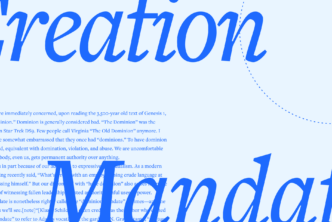This excerpt is adapted from Common Misconceptions about Common Church Problems by C. Gary Barnes.
Myth 1. Anxiety always results from sin or lack of faith
Now, of course, biblically, it’s clearly established that sinful choices can bring forth anxiety. But that’s a huge leap to say that every time you’re seeing anxiety, that’s a result of sinful choices or a lack of faith. This is a very complex package, and there are many possibilities, even biological, that can be key and instrumental in the experience of anxiety, even if a person’s not making personal sin choices.
Myth 2. Anxiety is caused by personal weakness
This is a very important one, especially for those of you who may think of yourselves as strong people. And also, you may look back at your life and say, “I don’t really have a problem with anxiety.” An easy, jumping-to-conclusion experience that you might have is to say, “Therefore, people who do experience anxiety are weak people,” or “If you would just be like me and be strong, you would not have anxiety.”
This is a huge myth, and we have clear data to support that many people who would be identified as so-called strong people or people of character or people of integrity—whatever your positive attribute you wanted to attach to it—still have a capacity to, and do, experience anxiety.
Myth 3. A true Christian should never be anxious
I think the thought behind this myth is that if we could just get our spirituality really on track and moving forward—in other words, if we could kind of work the Christian formulas, those would be the things that would prevent us from ever having to deal with a problem like anxiety. And again, this kind of goes back to myth number one. It is true that a person could, with sinful choices or unspiritual patterns of living, bring about a more likely outcome to experience anxiety.
But even if you’re really journeying well in your spiritual journey, that’s not a promise; that’s not a solid prevention strategy to avoid ever experiencing anxiety.
Myth 4. Anxiety should be cured by spiritual resources
A very similar myth, maybe coming at it from a little different angle. But again, it kind of taps into this formula approach: “If I just work the Christian formula right, then I will always get a right outcome. And that means I could even experience anxiety, but with my Christian formulas I could actually get rid of my experience of anxiety.”
Again, this is one of those wishful-thinking kinds of things, but this is so much more complex; there’s so many other additional factors that enter into the picture. We would have to say, yes, your spirituality is very significant. It really does make a difference, but it’s not the sole factor that’s making a difference here.
Myth 5. Using medication means I’m not relying on God
Using medication means that I’m not relying on God. This is an important myth to have nuanced because it is a possibility that you could use medication and not be relying on God. You could just be relying on the medication. But it would be wrong to conclude that if a person is using medication for anxiety, then therefore, that means they’re not relying on God. You actually could be relying on a very significant discovered truth that God has provided for you to help with a very complex problem that you’re having to deal with.
So I would actually flip it and say the truth of the matter is you could be a good steward before God if you’re using medication in a healthy way to address a need of anxiety.
***
Dispel three more myths about Christian anxiety, worry, and fear with the Logos Mobile Ed course Common Misconceptions about Common Church Problems. In under two hours, you’ll explore biblical responses to problems including addiction, depression, and divorce.
For a biblical response to other controversial topics, explore how to handle touchy subjects with Logos Mobile Ed courses ranging from beginner-level to in-depth.
The title of this post is the addition of the editor. The author’s views do not necessarily represent those of Faithlife.





